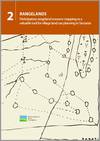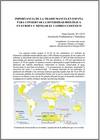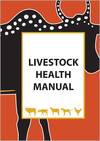Mobile indigenous peoples have sustainably managed the land they live on for centuries. However, in the name of biodiversity conservation, some have been displaced and removed from their traditional territories and left destitute and culturally weakened. While these practices have been largely unwanted in theory by biodiversity conservation agencies, progress in human rights observance and land compensation lagged behind new thinking on the relationship between people and protected areas. Thus, local and national policy and institutional change in the field have not kept pace with advances in thinking at the international level; nor do they always live up to public declarations of concern for human rights. Ten years after the Dana Declaration on Mobile Peoples and Conservation was formulated in Wadi Dana, Jordan, it is time to follow up on the achievements of the past decade and consider the future. This workshop report therefore, addresses the concerns regarding the welfare of mobile indigenous peoples in biodiversity conservation.
Year of publication: 2012Organization: Autores individuales
Topic: Servicios ambientales, Pueblos indígenas
Language: English
Type of document: Técnico, Políticas y legislación
Geographical coverage: Global
Pastoralists and other indigenous livestock keepers have created breeds that are a crucial asset to humanity in adapting to climate change, conserving biological diversity and sustaining food production in harsh and challenging environments. Biocultural protocols are a means of bringing to light the crucial role of communities in conserving indigenous breeds and in maintaining the web of life that depends on them. The film showcases biocultural Protocols highlighting the Raika community of Rajasthan and the Samburu of Kenya.
Year of publication: 2012Organization: , Liga de Comunidades de Pastores (LPP),
Topic: Cambio climático, Servicios ambientales, Pueblos indígenas
Language: English
Type of document: Videos
Geographical coverage: Global
Participatory mapping of rangelands has proved to be a vital and powerful information-generating tool for identifying and understanding the use of rangeland resources and access to them. This paper presents a mapping exercise that took place in the Ng’abolo village in Kiteto District in Tanzania.
Year of publication: 2012Organization: Coalición Internacional para el Acceso a la Tierra (ILC)
Topic: Tierra
Language: English
Type of document: Técnico
Geographical coverage: África Oriental
Las regiones áridas ocupan el 41,3% de los continentes, 6,5 millones de kilómetros cuadrados donde habitan unos 2.000 millones de personas, de los cuales 650 millones se encuentran entre los más pobres de los pobres. El 40% de estos territorios es aprovechado por pastores nómadas, el 25% por rancheros, el 12% por agricultores de secano y el 2% de regadío. El pastoreo extensivo desempeña un papel fundamental en la absorción del carbono atmosférico, reduciendo la erosión, conservando el agua, favoreciendo la actividad icrobiana y la incorporación de nutrientes, mejorando la estructura del suelo y su productividad. El manejo adecuado de los pastizales, la plantación de arbolado y las correctas prácticas agrícolas pueden fijar del 10 al 20% de las emisiones globales de combustibles fósiles, por lo que la conservación del pastoreo extensivo se plantea como una de las grandes alternativas para el desarrollo sostenible y la adaptación al cambio climático durante las próximas décadas.
Year of publication: 2012Organization: Autores individuales
Topic: Cambio climático, Servicios ambientales, Seguridad alimentaria, Innovación, Resiliencia
Language: Español
Type of document: Técnico, Científico, Mapas
Geographical coverage: Europa
When considering climate change, marginalized populations and pastoralists, warrant particular attention. Impacts on their territories and communities are anticipated to be both early and severe due to their location in vulnerable environments. Community-based and local knowledge may offer valuable insights into environmental change due to climate change, and complement broader-scale scientific research with local precision and nuance.
This report provides an overview of the published scientific literature (primarily peer-reviewed, but also grey) relating to the contribution of traditional/indigenous knowledge to our understanding of global climate change: observations, impacts, and opportunities for adaptation.
Year of publication: 2012Organization: Autores individuales
Topic: Cambio climático, El conocimiento indígena, Pueblos indígenas
Language: English
Type of document: Técnico
Geographical coverage: Global
Los países industrializados estamos afectando gravísimamente al medio ambiente de nuestro planeta, comprometiendo el futuro de toda la Humanidad. Es urgente reducir de inmediato nuestras emisiones de CO2 para que comiencen a decrecer antes de 2020, limitándolas a cero antes de 2050 respecto a los niveles de 1990. Para ello los países industrializados debemos modificar radicalmente nuestro modelo energético y nuestras pautas de consumo para intentar mitigar la crisis global que estamos provocando. Pero, junto a la reducción inmediata de las emisiones es necesario fomentar también los sumideros de carbono, que permitan retirar de la atmósfera el exceso de CO2 generado durante este último siglo.
Year of publication: 2012Organization:
Topic: Cambio climático, Seguridad alimentaria, Organización
Language: Español
Type of document: Boletines
Geographical coverage: Europa
An interdisciplinary team of researchers from the Health for Animals and Livelihood Improvement (HALI) Project collaborated with pastoralist communities living near the south-eastern border of Ruaha National Park in Tanzania to identify key diseases impacting livestock herd health. This information was then used to create this illustrated livestock health manual. This is particularly useful at the local level where it can be understood by most people in the communities where literacy rates may vary.
Year of publication: 2012Organization: Autores individuales
Topic: Economía, Seguridad alimentaria, Valeur ajoutée
Language: English
Type of document: Técnico
Geographical coverage: África Oriental
Water development enables the provision of a vital resource to sustain humans, animals and plants in Ethiopia’s arid areas. This report present an overview of water development in Ethiopia’s pastoral regions over the past 40 years.
Year of publication: 2012Organization: Instituto de Desarrollo de Ultramar
Topic: Seguridad alimentaria, Tierra, Servicios sociales
Language: English
Type of document: Técnico
Geographical coverage: África Oriental









